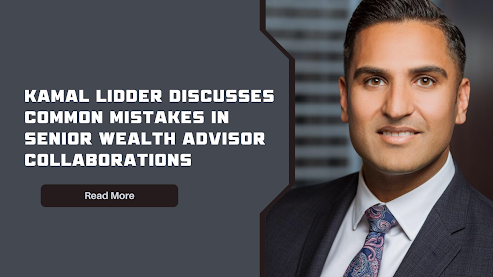Kamal Lidder Discusses Common Mistakes in Senior Wealth Advisor Collaborations
In the dynamic world of wealth management, collaboration between senior wealth advisors is not just beneficial—it's essential. These collaborations often lead to innovative strategies, improved client experiences, and enhanced overall performance. However, like any partnership, they can also encounter pitfalls if not navigated carefully. That's why today, we're delving into this topic with Kamal Lidder, a seasoned wealth management expert, to explore common mistakes in senior wealth advisor collaborations and how to avoid them.
Lack of Communication
Effective verbal exchange is the cornerstone of any successful collaboration. According to Kamal Lidder, failing to set up clean lines of verbal exchange can cause misunderstandings, missed opportunities, and, in the long run, a breakdown within the partnership. To avoid this pitfall, Kamal emphasizes the significance of regular check-ins, placing expectations in advance, and fostering an open mind wherein thoughts can glide freely.
Ego Clashes
In the fast-paced world of finance, ego clashes can often derail even the most promising collaborations. Kamal Lidder shows that senior wealth advisors have to test their egos at the door and prioritize the collective goal of serving their customers' first-rate interests. By fostering a tradition of humility, recognition, and collaboration, advisors can harness the electricity of teamwork to acquire extremely good consequences.
Failure to Leverage Each Other's Strengths
Every senior wealth marketing consultant brings a completely unique set of capabilities, reports, and perspectives to the desk. However, failing to leverage each other's strengths can restrict the effectiveness of the collaboration. Kamal Lidder advises senior advisors to take the time to apprehend each other's strengths and weaknesses and to delegate duties accordingly. By playing to each other's strengths, advisors can optimize their performance and provide superior outcomes for their customers.
Lack of Trust
Trust forms the foundation of any successful partnership. Kamal Lidder highlights the importance of building through transparency, reliability, and accountability. By demonstrating integrity in their actions and decisions, senior wealth advisors can domesticate an experience of consideration that fosters collaboration, innovation, and mutual fulfillment.
Failure to Adapt to Change
The economic panorama is continuously evolving, and senior wealth advisors have to be inclined to evolve to trade to live ahead of the curve. Kamal Lidder advises advisors to include innovation, stay knowledgeable about enterprise traits, and be inclined to pivot their strategies when important. By being agile and proactive, advisors can navigate marketplace fluctuations and deliver the most advantageous effects for their clients.
In the end, senior wealth consultant collaborations can power super costs for clients and firms alike. By avoiding unusual mistakes, which include loss of conversation, ego clashes, failure to leverage strengths, loss of agreement, and failure to evolve to change, advisors can unencumbered the total capability of their partnerships and gain extra achievement together. With a commitment to effective conversation, humility, collaboration, trust, and adaptability, senior wealth advisors can navigate the complexities of wealth control with self-belief and reap incredible consequences.




Comments
Post a Comment